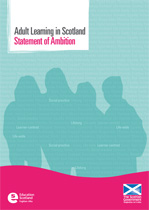The Scottish Government today launched Adult Learning in Scotland: Statement of Ambition. This is one of a number of broad vision statements covering different areas of Scottish education, and its broad purpose is to guide policy development over the next five years. What should we make of it?
My initial reaction, as well as my more considered response, is that this is a very welcome statement indeed. The statement acknowledges the central role of adult learning in helping people change and develop – as individuals, as family members, as workers, and as part of the wider community. It sets out broad principles – namely, that larning should be lifelong, life-wide and learner-centred. And it calls for a broad range of provision, with learners involved in planning, developing and evaluating that provision.
Much of this may well remind you of the optimistic policy debate over lifelong learning of the mid-1990s. Key texts such as Learning: the treasure within from UNESCO and England’s The Learning Age expressed similar hopes and values in very similar language. The first main ambition listed in the Scottish statement – for Scotland to be ‘recognised globally as the most creative and engaged learning community’ – could have appeared in any of a score of policy papers from different countries. So could several of the other proposals, such as high quality training for professionals, giod quality advice and guidance, or the recognition of informal learning.
But there are also new and distinctive features in the Scottish statement. The most significant of these is the role envisaged for learners in driving the system forward. The Scottish Government set out to engage with learners in producing the statement, and it contains broad proposals for empowering learners not only in their own learning but in developing policy.
And this is also a key feature in the strategy for taking the ambitions forward. The first step listed in the statement is the creation of a cross-sectoral task group to develop a strategic implementation plan; the second is to ‘ensure learners are involved in the process’.
There are some obvious challenges in taking this forward. What about people who are, or see themselves as, non-learners – who think the system is ‘not for me’? What about working learners, with limited time to spare on meetings that may or may not meet their needs? Will the loudest voices be those of the most articulate and confident – and indeed the best educated and most affluent? And will some people simply become semi-pro learners, constantly speaking for other learners long after moving on from the experiences that brought them into learning?
I’m sure there are plenty of other practical questions like this, but the principle is a good one. Of course professional adult educators will also have relevant knowledge and experience to bring to this debat. And we have plenty of time, as nothing much is going to happen this side of the Scottish Referendum in September – and the issues and challenges will still be here whatever the voters decide.
So it would be interesting to hear from anyone who has tried to organise learner voice in this way, whether in the UK or elsewhere, or who simply has some ideas about how it might be done.
And a few closing words on resources. In practice, the Scottish Government has prioritised young full-time learners, particularly in higher education. As a result of selective funding cuts, colleges alone have lost over 196,000 enrolments of part-time further education students since the current government took power in 2007; almost all of these were adults and well over half were women.
Decide for yourself what this tells us, if anything, about the scale of the political challenge ahead. But the history of adult education has always been a history of struggle, and no one in Scottish adult learning expects a statement of ambition alone to change that fact.




